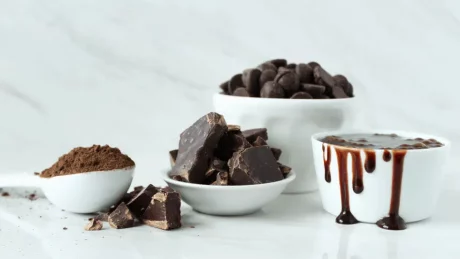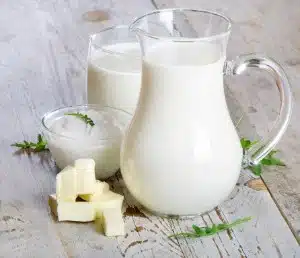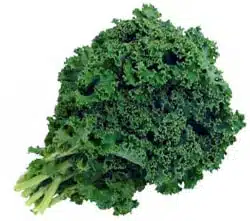
Every day in the news and social media, we see or hear health stories that evoke confusion, fear, and self-doubt. One day, a particular food is the best thing for you — and the next we’re instructed to run away from it as if it is the “tiger in the room”.
As a holistic nutritionist and educator, I am constantly asked questions from my clients, students, and online community about something they’ve read or heard. Often they’re not sure how to discern which health fears are founded on evidence, and which ones need to be banished.
To help with these myths about nutrition, I’m sharing some of the most common health tips I’ve heard that I think are worth questioning:
5 Myths About Nutrition:
1. “Stay out of the sun and always use sunscreen.”
We’ve long been told that we should avoid the sun and slather ourselves in sunblock when we’re exposed to its damaging rays.
But some sun is incredibly important to our overall health. It’s our primary source of vitamin D which is crucial to bone health, the immune system, and hormone production. Although vitamin D is found in small amounts in some foods, 80 to 90 percent is made in your skin when exposed to the sun’s rays. That means wearing even a thin film of sunscreen can block that crucial absorption from happening. Here’s a whole article on
“The Sunshine Vitamin”.
So how to enjoy “safe sun”? During the peak summer months, being outside with legs and arms exposed, between 11.00am and 3.00pm for
half the amount of time it would take you to go pink provides adequate exposure, with no risk of damaging your skin. Other than that: stay in the shade and/or cover up.

2. “Too much kale is bad for you.”
Kale has recently experienced a swift rise as a superfood. But then as soon as people started to like it, they were slammed with the news that kale can be toxic to your thyroid and that it might overload the body with heavy metals.In theory, large quantities of cruciferous (also known as brassicas) vegetables (kale, broccoli, cabbage etc) could affect the thyroid. However, you would have to ingest massive amounts, like juicing several heads of kale or cabbage a day. For most people it is not likely that their consumption would come anywhere near this amount needed to cause problems. In addition, cooking these vegetables inactivates the goitrogens (the compounds that have an anti-thyroid action) so if you do have an underactive thyroid you might prefer to ensure your brassicas are lighlty cooked. On the other hand if you have an over-active thyroid, tuck in. But you’ll need to eat massive amounts (breakfast, lunch and dinner) of raw kale to have any appreciable impact.
The reality is that when it comes to thyroid health, there are far more important things to worry about than kale consumption. For example, drinking fluoridated water might be problematic because it may displace iodine, an essential mineral to the thyroid. And the health benefits of kale and other cruciferous vegetables far outweigh possible risks.
As for heavy metal warnings, this is entirely dependant on the soil it’s grown on – as for all veges. Choose organic kale (or any vege for that matter) to reduce your exposure to toxins. For overall health, it’s helpful to rotate kale with other greens. But that doesn’t mean we need to eliminate it entirely.
3. “Avoid saturated fat because it causes heart disease.”
For the last few decades we were constantly being told that fat would make us fat and we’d get heart disease from it. This led to the low-fat and fat-free food craze. Unfortunately what happened was fat got replaced with sugar and refined carbohydrates. And people really started to stack on
the weight. Diabetes rates have soared and heart disease is rampant.
Latest research tells us we had it all wrong and a recent
meta-analysis concluded that the nutritional warnings we had received about fats decades ago was unfounded.
Incredulously an investigation has been revealed that the “expert” advisory committee providing advice for nutritional guidelines, did not formally review the literature on saturated fats from the past five years, even though several prominent papers published since 2010 failed to confirm any association between saturated fats and heart disease. Despite a great deal of conflicting evidence over the past five years, the committee’s report concludes that the evidence linking consumption of saturated fats to cardiovascular disease is “strong.”(
Science Daily article)
What is also important is the role that “good” fats have in nourishing the brain and liver and helping with our mood. It’s the source of fat that is key: Choose clean, organic sources from either animals or plants to reap the health rewards.

4. “We need dairy for strong bones.”
Marketers have been successful at convincing us that dairy is this massively important thing that we must have tons of, or else we’ll get all sorts of nutrient deficiencies and diseases.
The truth is, you don’t necessarily need milk or cheese or yogurt to have strong bones. New Zealand has one of the highest rates of dairy
consumption in the world, but we also have some of the highest rates of osteoporosis. And
studies have suggested that drinking more milk doesn’t protect against fractures. High dairy intake is also associated with our high prostate cancer rate.
We’ve been raised to believe that calcium is synonymous with bone health. And sure, calcium is essential to our bones. But no mineral (or vitamin) works in isolation in the body – they work in synergy: It’s not just calcium we need but also magnesium,phosphorus, vitamin D, vitamin K, and more. Excessive calcium intake has been associated with increased risk of heart disease and there are moves in some research centres to suggest that the current RDI (around 1000mg/day for adults) is too high.
Ideally we should get plenty of calcium from plant-based sources. Some of the best are sesame seeds, almonds, tofu, dark leafy greens, broccoli, and seaweed. The calcium in these foods is more bioavailable to us — meaning we are better able to digest, absorb, and utilise it – and it comes complete with other nutrients that we need.

5. “We should be all following the X diet”
(Replace the X with whatever the latest fad you’ve heard of)
Each person is unique, which makes their nutritional needs unique. While there are some sensible general principles to follow, an individualised approach to diet is better for each person.
For individualised nutritional advice make an appointment to see Sharon here.










